Tetramitus
Johan F. De Jonckheere- Tetramitus aberdonicus (Page 1974) Brown, De Jonckheere 1999
- Tetramitus anasazii De Jonckheere, 2007
- Tetramitus angularis Robinson, De Jonckheere, Dobson, 2007
- Tetramitus entericus (Page 1974) Brown, De Jonckheere 1999
- Tetramitus hohokami De Jonckheere, 2007
- Tetramitus horticolus (Singh, Hanumaiah 1979) De Jonckheere, Brown 2005
- Tetramitus jugosus (Page 1967) Brown, De Jonckheere 1999
- Tetramitus lobospinosus (Craig 1912) Brown, De Jonckheere 1999
- Tetramitus ovis (Schmidt 1913) De Jonckheere, Brown, 2005
- Tetramitus parangularis Robinson, De Jonckheere, Dobson, 2007
- Tetramitus pararusselli De Jonckheere, Brown, Walochnik, Aspöck, Michel, 2005
- Tetramitus rostratus Perty, 1852
- Tetramitus russelli (Singh 1952) De Jonckheere, Brown, Walochnik, Aspöck, Michel, 2005
- Tetramitus thermacidophilus Baumgartner, Eberhardt, De Jonckheere, Stetter, in press
- Tetramitus thorntoni (Singh 1952) Brown, De Jonckheere 1999
- Tetramitus vestfoldii Murtagh, Dyer, Rogerson, Nash, Laybourn-Parry, 2002
- Tetramitus waccamawensis (Sawyer, Nerad, Cahoon, Nearhoof 1998) De Jonckheere, Brown, 2005
Introduction
The genus Tetramitus contains species that can or cannot transform to the flagellate stage, as is the case in the genus Naegleria. At present 15 species are recognized in the genus. Although all belong to the genus Tetramitus, the cyst morphology varies much more between Tetramitus spp. (Fig. 1) than in the genus Naegleria. The cyst can have a smooth wall or a wrinkled outer wall, both with no pores such as in T. wacamawensis, T. ovis and T. jugosus, one pore such as in T. horticolus, or several pores such as in T. angularis. This high variation in cyst morphology lead some investigators to erect different genera for some isolates that were later placed within Tetramitus by molecular data (Brown and De Jonckheere 1999, De Jonckheere and Brown 2005).

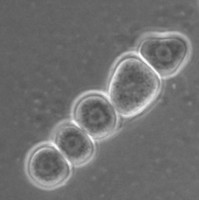
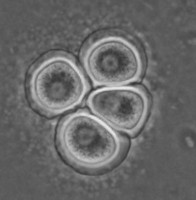
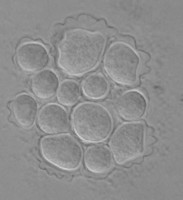
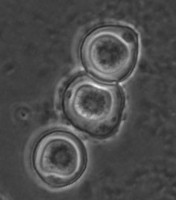
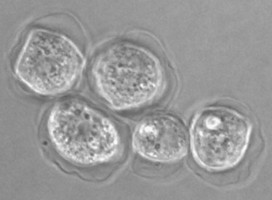
Fig. 1. Cysts of Tetramitus spp. Top: Tetramitus wacamawensis, Tetramitus ovis, and Tetramitus jugosus. Bottom: Tetramitus horticolus and Tetramitus angularis. © Johan F. De Jonckheere.
In the genus Tetramitus an extremophile has been detected, T. thermacidophilus which grows in a pH range of 1.2 – 5 and a temperature up to 54°C (Baumgartner et al. in press).
References
Baumgartner, M., Eberhardt, S., De Jonckheere, J. F., Stetter, K. O. Tetramitus thermacidophilus n. sp., an amoeboflagellate from acidic hot springs. J. Eukaryot. Microbiol. in press.
Brown, S., De Jonckheere, J.F. A reevaluation of the amoeba genus Vahlkampfia based on SSUrDNA sequences. Europ. J. Protistol. 35, 49-54, 1999.
De Jonckheere, J. F. Molecular identification of free-living amoebae of the Vahlkampfiidae and Acanthamoebidae isolated in Arizona (USA). Europ. J. Protistol. 43, 9-15, 2007.
De Jonckheere, J. F., Brown, S. The identification of vahlkampfiid amoebae by ITS sequencing. Protist 156, 89-96, 2005.
De Jonckheere, J. F., Brown, S. Isolation of a vahlkampfiid amoeba from a contact lens: Tetramitus ovis (Schmidt, 1913) n. comb. Europ. J. Protistol. 41, 93-97, 2005.
De Jonckheere, J. F., Brown, S., Walochnik, J., Aspöck, H., Michel, R. Morphological investigation of three Tetramitus spp. which are phylogenetically very closely related: Tetramitus horticolus, Tetramitus russelli n. comb. and Tetramitus pararusselli n. sp. Europ. J. Protistol. 41, 139-150, 2005.
Murtagh, G. J., Dyer, P. S., Rogerson, A., Nash, G. V., Laybourn-Parry, J. A new species of Tetramitus in the benthos of a saline antarctic lake. Europ. J. Protistol. 37, 437-443, 2002.
Page, F. C. A New Key to Freshwater and Soil Gymnamoebae. Freshwater Biological Association, Ambleside, Cumbria, 1988.
Robinson B. S., De Jonckheere J. F., Dobson P. J. New Tetramitus species (Heterolobosea, Vahlkampfiidae) from cold aquatic environments. Europ. J. Protistol. 43, 1-7, 2007.
About This Page
This page is being developed as part of the Tree of Life Web Project Protist Diversity Workshop, co-sponsored by the Canadian Institute for Advanced Research (CIFAR) program in Integrated Microbial Biodiversity and the Tula Foundation.
Johan F. De Jonckheere

de Duve Institute and Scientific Institute of Public Health, Belgium
Correspondence regarding this page should be directed to Johan F. De Jonckheere at
jdjonckh@ben.vub.ac.be
Page copyright © 2008 Johan F. De Jonckheere
All Rights Reserved.
- First online 21 September 2008
- Content changed 21 September 2008
Citing this page:
De Jonckheere, Johan F. 2008. Tetramitus. Version 21 September 2008 (under construction). http://tolweb.org/Tetramitus/124650/2008.09.21 in The Tree of Life Web Project, http://tolweb.org/






 Go to quick links
Go to quick search
Go to navigation for this section of the ToL site
Go to detailed links for the ToL site
Go to quick links
Go to quick search
Go to navigation for this section of the ToL site
Go to detailed links for the ToL site